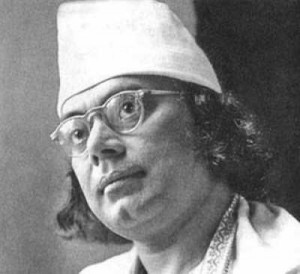
Kazi Nazrul Islam came in to this world in 1899 in Bengal (the Burdwan district) into an influential Muslim quazi (justice) family. His father was the imam and also the caretaker of their local mosque so it was clear what path this young boy would follow. Attendance at a religious school saw him study Islamic philosophy, biology, theology, the Qur”an and other scriptures. The family were dealt a devastating blow when Nazrul was only 9 years old and he lost his father. Even at this early age he was able to step in to his father’s place as caretaker of the mosque and, in addition, he assisted the teachers at his school.
Nazrul didn’t like to stand still though and joined an uncle who ran a theatrical group that travelled the country. Here he learned about acting and became a writer of poems and songs for the plays that were performed. His deep thirst for knowledge led him towards Sanskrit and Bengali literature along with the Hindu scriptures including the Puranas. The association with this travelling group was, however, short lived as he soon left to enrol at the Searsole Raj High School in Raniganj at the age of 10. Here the seeds of his revolutionary nature were sown as, courtesy of his teacher, the JugAntar activist Nibaran Chandra Ghatak.
High school followed – and Kazi attended Mathrun High English School – but paying school fees was a struggle so he left early to earn some money in fairly menial jobs. His education proper began though in 1914 at the Darirampur School which is now a university. Nazrul’s studies included classical music and Persian literature and he was a model pupil, impressing his tutors. Despite this though he left this establishment before completing his examinations to join the Indian Army which he did so in 1917. He saw this as a romantic venture as well as an opportunity to pursue political interests. It was at this time that his first poetry and prose were penned and, self-motivated, he continued his education throughout military service.
The seeds of the revolutionary nature, planted some years before, now began to germinate and he turned his attention to the bringing down of the British Raj once he had completed his military service. Like many of his compatriots he was offended by the fascist and oppressive nature of Imperialism and his prolific output of written works, along with nationalist activities, earned him the popular title of Bidrohi Kobi (Rebel Poet).
His huge body of written work – poetry, prose and some 4,000 songs – led him to be officially recognised as the national poet of Bangladesh and he is still commemorated in India. His passionate pursuit of Indian independence found him languishing in jail where his status as a political prisoner led to many writings such as “Rajbandir Jabanbandi” (“Deposition of a Political Prisoner”). Below is a brief extract from this:

It is clear from these words that he did not, and never would, accept the authority of the ‘insignificant king’. His cause was just and he had the mighty Shiva behind him to back up his beliefs. Here, and outside of prison, he championed the causes of the poor and downtrodden and was seen, by them, as a hero.
His health declined steadily from the age of 43 and some have suggested that the British Government had some hand in this as he was suffering from some unknown disease. He became an isolated figure as the years went by but, in recognition of all that he had done for his people, he was invited by the Government of Bangladesh to move to Dhaka in 1972. All of his family went with him but, sadly, the ‘Rebel Poet’ died four years later at the age of 73.

